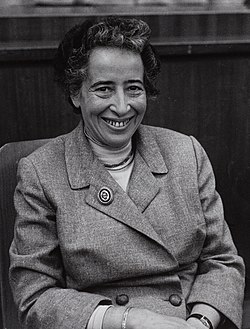Hannah Arendt Quote
Adolf Eichmann went to the gallows with great dignity. He had asked for a bottle of red wine and had drunk half of it. He refused the help of the Protestant minister the Reverend William Hull who offered to read the Bible with him: he had only two more hours to live and therefore no time to waste. He walked the fifty yards from his cell to the execution chamber calm and erect with his hands bound behind him. When the guards tied his ankles and knees he asked them to loosen the bonds so that he could stand straight. I don’t need that he said when the black hood was offered him. He was in complete command of himself nay he was more: he was completely himself. Nothing could have demonstrated this more convincingly than the grotesque silliness of his last words. He began by stating emphatically that he was a Gottgläubiger to express in common Nazi fashion that he was no Christian and did not believe in life after death. He then proceeded: After a short while gentlemen we shall all meet again. Such is the fate of all men. Long live Germany long live Argentina long live Austria. I shall not forget them. In the face of death he had found the cliché used in funeral oratory. Under the gallows his memory played him the last trick he was elated and he forgot that this was his own funeral. It was as though in those last minutes he was summing up the lesson that this long course in human wickedness had taught us-the lesson of the fearsome word-and-thought-defying banality of evil.
Adolf Eichmann went to the gallows with great dignity. He had asked for a bottle of red wine and had drunk half of it. He refused the help of the Protestant minister the Reverend William Hull who offered to read the Bible with him: he had only two more hours to live and therefore no time to waste. He walked the fifty yards from his cell to the execution chamber calm and erect with his hands bound behind him. When the guards tied his ankles and knees he asked them to loosen the bonds so that he could stand straight. I don’t need that he said when the black hood was offered him. He was in complete command of himself nay he was more: he was completely himself. Nothing could have demonstrated this more convincingly than the grotesque silliness of his last words. He began by stating emphatically that he was a Gottgläubiger to express in common Nazi fashion that he was no Christian and did not believe in life after death. He then proceeded: After a short while gentlemen we shall all meet again. Such is the fate of all men. Long live Germany long live Argentina long live Austria. I shall not forget them. In the face of death he had found the cliché used in funeral oratory. Under the gallows his memory played him the last trick he was elated and he forgot that this was his own funeral. It was as though in those last minutes he was summing up the lesson that this long course in human wickedness had taught us-the lesson of the fearsome word-and-thought-defying banality of evil.
Related Quotes
Certainly we can say that the pace of modern life, increased and supported by our technology in general and our personal electronics in particular, has resulted in a short attention span and an addict...
About Hannah Arendt
Her works cover a broad range of topics, but she is best known for those dealing with the nature of wealth, power, fame, and evil, as well as politics, direct democracy, authority, tradition, and totalitarianism. She is also remembered for the controversy surrounding the trial of Adolf Eichmann, for her attempt to explain how ordinary people become actors in totalitarian systems, which was considered by some an apologia, and for the phrase "the banality of evil." Her name appears in the names of journals, schools, scholarly prizes, humanitarian prizes, think-tanks, and streets; appears on stamps and monuments; and is attached to other cultural and institutional markers that commemorate her thought.
Hannah Arendt was born to a Jewish family in Linden in 1906. Her father died when she was seven. Arendt was raised in a politically progressive, secular family, her mother being an ardent Social Democrat. After completing secondary education in Berlin, Arendt studied at the University of Marburg under Martin Heidegger, with whom she engaged in a romantic affair that began while she was his student. She obtained her doctorate in philosophy at the University of Heidelberg in 1929. Her dissertation was entitled Love and Saint Augustine, and her supervisor was the existentialist philosopher Karl Jaspers.
In 1933, Arendt was briefly imprisoned by the Gestapo for performing illegal research into antisemitism. On release, she fled Germany, settling in Paris. There she worked for Youth Aliyah, assisting young Jews to emigrate to the British Mandate of Palestine. When Germany invaded France she was detained as an alien. She escaped and made her way to the United States in 1941. She became a writer and editor and worked for the Jewish Cultural Reconstruction, becoming an American citizen in 1950. With the publication of The Origins of Totalitarianism in 1951, her reputation as a thinker and writer was established, and a series of works followed. These included the books The Human Condition in 1958, as well as Eichmann in Jerusalem and On Revolution in 1963. She taught at many American universities while declining tenure-track appointments. She died suddenly of a heart attack in 1975, leaving her last work, The Life of the Mind, unfinished.
